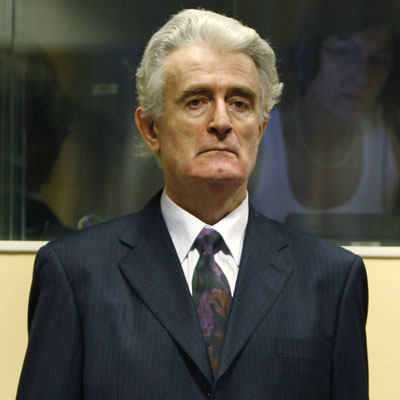 |
|
Former Bosnian Serb leader Radovan Karadzic stands in the court room of the International Criminal Tribunal for the Former Yugoslavia at the start of his initial appearance in The Hague July 31, 2008. Karadzic faces a UN war crimes judge for the first time to answer charges of genocide for his actions in the 1992-95 Bosnia war. [Agencies]
|
Though dismissive of the court, Karadzic was respectful, stood at military attention when Orie entered the courtroom and sat motionless as the judge summed up the charges against him.
Orie also cut Karadzic off when he began speaking about a deal he insists he made with UN negotiator Richard Holbrooke in 1996, a year after he was indicted by the UN court in The Hague.
The judge did not allow him to fully explain his version of events. He said the court would hear those complaints at the right time, but "the appropriate moment is not now." He suggested Karadzic file a legal submission in writing.
"This is my filing," Karadzic said, holding out the sheaf of papers at arm's length.
The US State Department declined to discuss the issue. Spokesman Sean McCormack referred questions about it to Holbrooke, whom he said has publicly denied any such deals.
He said Thursday that in 1996 he did go to Belgrade "to negotiate an agreement with Milosevic and two of Karadzic's henchmen that Karadzic would quit as president of the Serbian portion of Bosnia and as head of his political party immediately and disappear from public life."
Karadzic "reluctantly signed that agreement without ever coming to the negotiations," Holbrooke said.
But Holbrooke dismissed claims that the United States had in return promised Karadzic that there wouldn't a "search to capture him if he would disappear."
"He's one of the greatest mass murderers of the world and he's putting this out in order to defend himself. It's an invented story and no one ought to believe it," Holbrooke said.
Orie scheduled a new hearing on Aug. 29 at which Karadzic must enter pleas. If he does not, the court will enter pleas of innocent on his behalf.
But Karadzic's face showed frustration when Orie refused to let him read a prepared four-page statement outlining "numerous irregularities," including a claim that he was kidnapped three days before his announced arrest in Belgrade on July 21.
Hamayun Akbari, a British lawyer who was one of about 200 people watching the session from behind the glass of the public gallery, said Karadzic may have raised the issues of "irregularities" to support allegations later that he was not getting a fair trial.
"His behavior was correct. At the same time, he wants to sabotage the proceedings," said Akbari, part of a group from the Hague Academy of International Law which received coveted seats.

